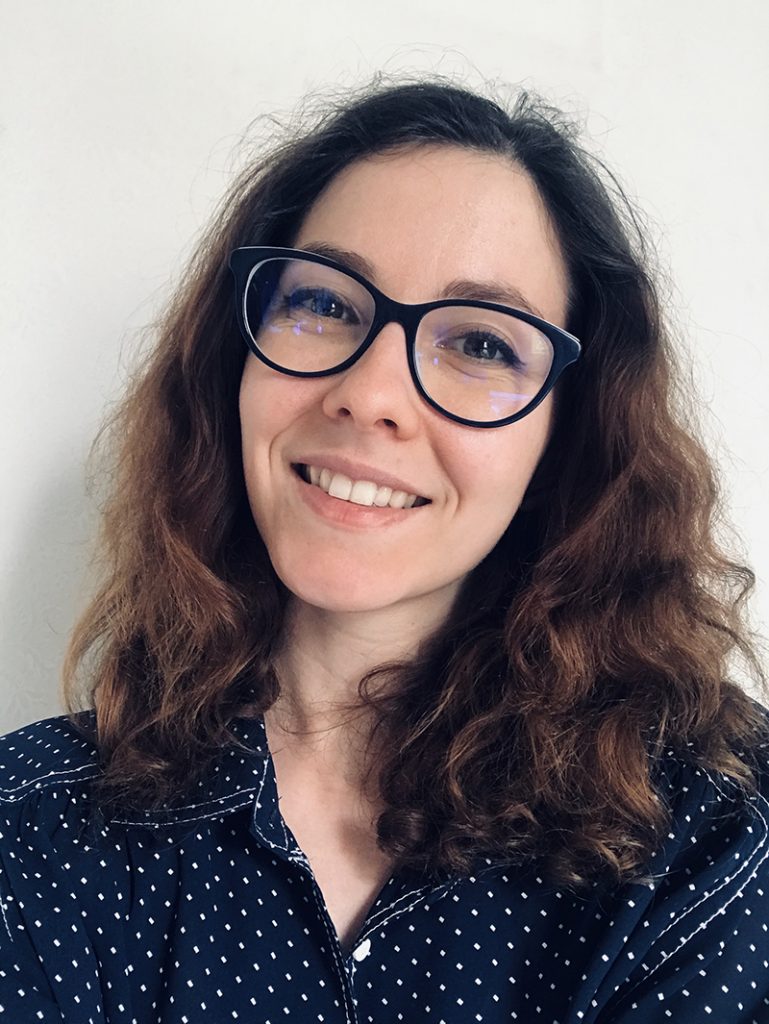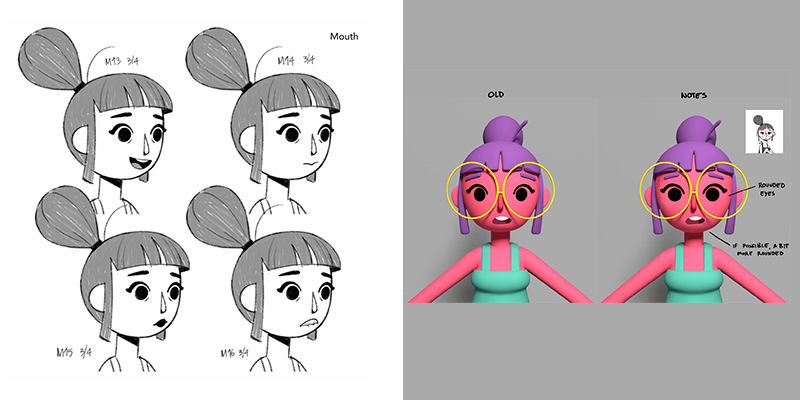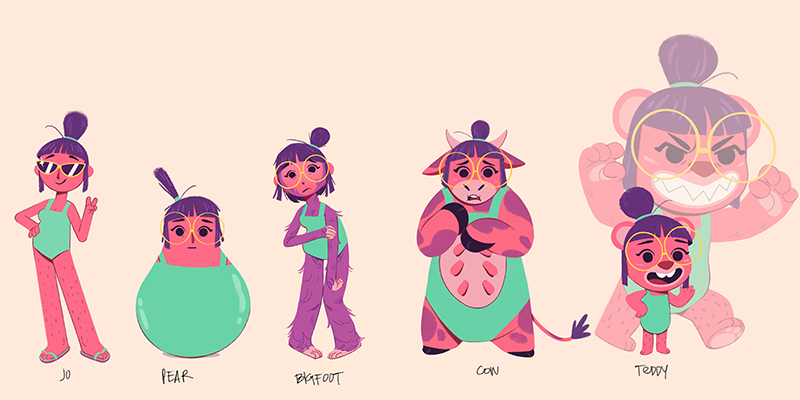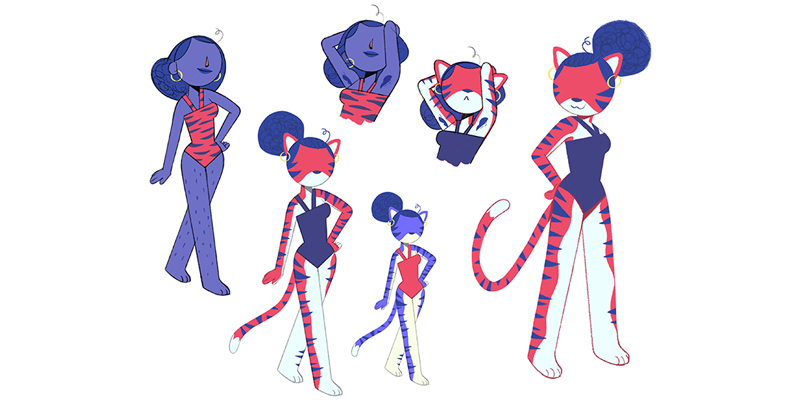
In an age where social media has led to a lot of insecurities due to physical appearances, there’s an animated short that has addressed this issue and is an attempt to boost confidence especially amongst the adolescents who are at their most vulnerable point in life. Recently, this short was chosen as one of the top animated short films of 2020 by Creativepool.

Directed by Blue Zoo Animations’ lead animator Zoé Risser comes In Shapes!. Born from the single word “puberty” and a brief to combine 2D and 3D animation creatively, this short was made completely remotely by Blue Zoo (BZ) artists and the 2020 BZ summer interns.
According to the studio, In Shapes is an emotive and poignant mixed-media animation exploring the insecurities of a girl at the swimming pool. Created in portrait specifically for social media, the aim of the film is to empower young people who feel insecure about their appearance.
AnimationXpress got in touch with Zoé Risser to know more about her story and what went behind the making of this beautiful, quirky short. Talking about how she ventured into the field of animation, Risser shares, “The books, TV series or movies I have grown up watching, led me to think that stories, in general, can touch people deeply and on a personal level, and are an amazing way to spread awareness on various subjects and bring empathy to people. And that’s how animation attracted my attention as it gives a lot of freedom of expression with colours, shapes, and designs.”
In Shapes is the story of how you can lose confidence and love for yourself because of what others impose on you, particularly at that age when everybody tries to fit in.
It’s been four years since she’s been working at Blue Zoo and got promoted as a lead animator this year. Talking about her journey, she says, “Wonderful and with lots of surprises! What I love about being a lead, just as when you are a director, is the human aspect of it. Taking care of my team is something I really enjoy. I worked on various and very different productions and this year I had the amazing chance to be chosen to direct In Shapes as part of the Blue Zoo shorts program.”
So what’s Blue Zoo shorts program?
Each year, Blue Zoo runs the shorts program in summer and at Christmas. The team is proposed a brief and anyone in the studio – HR, finance, animation, literally anyone – can pitch for a chance to direct the short. The entire studio then votes for their preferred pitch, in the form of a questionnaire (interest in seeing the idea developed, respect of the brief etc). The lucky winner is then revealed and can direct or co-direct it. Mentions Risser, “Last summer the brief inspired me so I decided to pitch for the first time. And I’m really glad I did!”
Being chosen as the director, one of the crucial things is to understand how to weave a story. When asked if she thinks storytelling is an important skill set for an animator, she affirms, “Absolutely. Of course, an animator must also have acting and observation skills, as well as a certain empathy I believe, to understand a character’s motivation and personality and convey a convincing performance. But storytelling is crucial to imagine different ways of illustrating an emotion or situation through gestures, and how to link a series of actions with meaning. An animator must be able to adapt the performance depending on the context, the props involved, and use the camera to guide the viewer’s eye. So a mix of script analysis and visual narration, I think.”

The theme for the summer short was one word: Puberty. When Risser heard about it, it instantly brought back her teen memory when two boys made fun of the hair on her ankles, something which she didn’t even notice nor was worried about until that moment. That was one event among others that made her progressively self-aware of her body and how she looked like. “I realize now how it deformed the perception of my reflection in the mirror, and from some reactions to the movie, it is clearly a universal feeling. In Shapes is the story of how you can lose confidence and love for yourself because of what others impose on you, particularly at that age when everybody tries to fit in. I hope this movie can be like a big sister or brother, or you telling your younger self, ‘it’s ok to be the way you are, as we come all in different shapes’.”
The short had the message of body positivity. Explaining her point of view, Risser shares, “I think body positivity is crucial. We all come in different shapes and still, we try to fit people into specific, standardized boxes. This is terrible for self-love and confidence, as we can’t change ourselves to meet those norms, it’s exhausting and anyway, it is very subjective so it’s impossible to please everybody. That’s why I think it’s essential to come at peace with ourselves and especially our bodies.”
I think animation can help turn the social media weapon against itself! Social media has a big weakness and a big advantage: it’s spreading information fast and far.
The project took about three months to complete as they started the production beginning of July and finished at the end of September. The whole pitching process took place in June.

We can observe the short has a blend of 2D and 3D animation as the studio wanted the movie to be a mix of the two as their next challenge. They wanted to combine the strengths of their 3D and 2D skills, to make a short film that shows the best of both mediums, in a creative and fun way.
Shedding light on some of the notable highlights and challenges while working on In Shapes, Risser says, “Blending the mix of 2D and 3D was definitely one of the biggest challenges. For this project, I decided not to blend the two mediums, but actually play with their strengths. I wanted to reproduce a collage with the 2D composed on top of the 3D. But coming up with how to compose and harmonize the two together was very interesting.
Another challenge, more on a personal view, was that it was the first time I directed and I had to learn the job on the spot. Which was very exciting, but intense as at the same time I kept being a lead animator on the project I was on before starting the short film. Finding the balance was not easy!”
There were 36 people participating in the project, some of them undertaking multiple roles across the production. “We had seven amazing interns which I also count in the following: the production included one – director, art director, storyboarder, visual development and character design artist, background and design artist, set modelling artist, 2D rigger, 2D FX artist, editor, music compositor, production manager and production assistant; two – character modelling artists, prop modelling artists, 2D animators, Pipeline TDs, sound designers, producers; three – light and composition artists; four – looking development and texture artists; and five – 3D riggers and 3D animators.”

Coordinating and managing a team of 36 is no easy feat especially while working in a remote set-up. So how was it working in a remote set-up?
Risser shares, “It was challenging as the whole production was remote, obviously. Luckily everybody had been working from home for a few months when production started, so we already had adapted to this new setting. It does come with its inconveniences, communication is scattered a bit through emails and chats and calls, information needs to be carefully transferred, and repeated. There’s this distance that makes checking with artists and mentoring interns less organic. But on the other hand, remote working has allowed us to be able to work with artists from all across the world.”
The short has been made to spread the word and tackle issues on social media, the question that follows is whether animation and storytelling can do so.
A positive Risser says, “I think animation can help turn the social media weapon against itself! Social media has a big weakness and a big advantage: it’s spreading information fast and far. If it can be used (intentionally or not) to put people down, it can also be used to cheer them up! With animation, you can tell any story, with any kind of representation and inclusion. It can help connect people who relate on different terms such as a common passion or a similar personal story. I think offering different narratives can also open dialogue among people who disagree.”
As the project comes to end, we tend to feel a void. Risser was no exception. Filled with mixed feelings she ponders, “We finished the project in September so it’s been a little while now but I absolutely remember the mix of feelings I experienced: exhaustion, relief, impatience, happiness… I was getting nervous about how the movie would be received, but also couldn’t wait to share it!
I thought I’d hate it like some artists sometimes do once their project is completed, so it might sound a bit pretentious but I actually felt proud of all the work we accomplished together, talking about a subject close to my heart. About that void, indeed, I got used to being on several fronts at the same time, and not being that busy anymore didn’t feel right. I remember I was saying I couldn’t wait to be finally done and rest, but very soon after, I started to think ‘actually, A legjobb valódi pénzes legális online kaszinók Magyarországon: https://www.edenkert.hu/vilagos-zold/zold-biznisz/a-legjobb-valodi-penzes-legalis-online-kaszinok/7678/ I need to get back into another project asap!!’”
Will we get to see more shorts/series tackling different issues?
Hopeful Risser comments, “I hope so! In a previous TV series I worked on, Go Jetters, I was really proud to animate an episode raising the issue of plastic in the ocean, showing the Great Pacific Garbage Patch. I think talking to children about these issues as well, in an appropriate way for them of course, is very important as they will be the citizens of tomorrow.
If I have the opportunity, I’d love to work on shorts that bring awareness to different subjects that matter to me, not just social issues but in general human rights, global warming, equality, mental health… we’ll see what comes next!”
